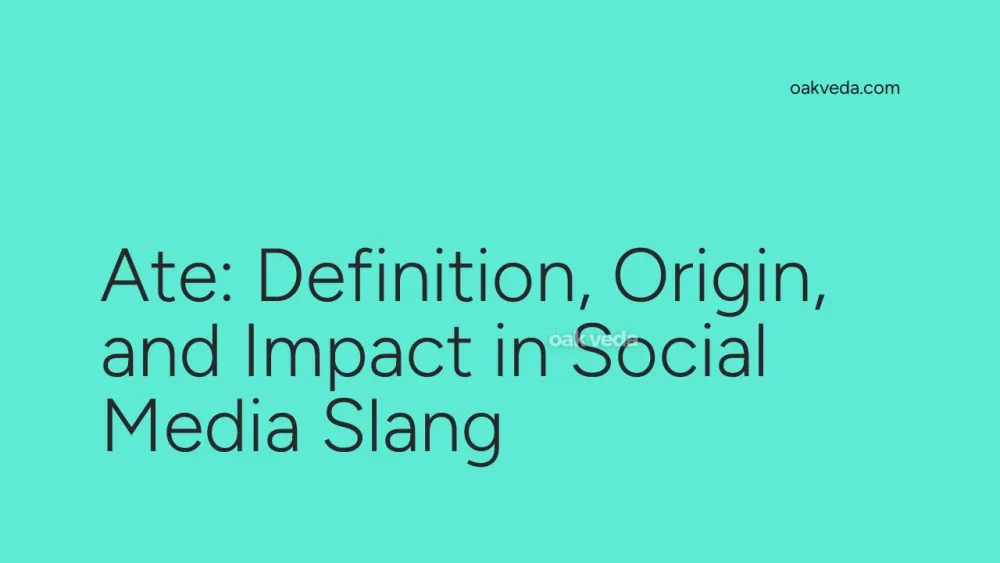
What is "Ate" in Social Media Slang?
In the ever-evolving world of social media slang, "ate" has emerged as a popular term to express admiration and praise. When someone says "she ate," "he ate," or "they ate," they're not talking about food consumption. Instead, this phrase is used to convey that a person has done an exceptional job or performed impressively in a particular context.
Origin and Development of "Ate"
The origin of "ate" as a slang term can be traced back to the early 2000s, primarily within the African American and LGBTQ+ communities. It gained significant traction in the ballroom scene, a subculture that celebrates and showcases LGBTQ+ performers, particularly those from Black and Latinx backgrounds.
Initially, "she ate" was used to compliment a woman who delivered an outstanding performance in a drag show, dance competition, or other artistic displays. Over time, the usage of "ate" expanded beyond its original context, becoming a versatile expression of praise in various situations.
How "Ate" Works in Social Media Communication
The term "ate" is typically used in the past tense, even when referring to recent or ongoing events. It's often accompanied by emphatic punctuation or emojis to amplify the sentiment. For example:
- "Did you see her performance? She ate! 🔥👏"
- "That new album just dropped, and he ate on every track! 🎵🙌"
- "Their presentation was flawless. They really ate that! 💯"
The phrase is flexible and can be applied to various contexts, from fashion and music to professional achievements and personal accomplishments.
Popular Examples of "Ate" in Use
To better understand how "ate" is used in social media, let's look at some popular examples:
- Fashion: "Her Met Gala look ate! She understood the assignment."
- Music: "That new artist ate the vocals on their debut single."
- Sports: "He ate that game-winning shot like it was nothing!"
- Academic: "She ate that dissertation defense. The committee was impressed."
These examples demonstrate the versatility of the term across different domains of excellence.
Impact of "Ate" on Social Media Culture
The widespread adoption of "ate" in social media discourse has had several notable impacts:
- Positive reinforcement: It provides a quick, emphatic way to praise and uplift others' achievements.
- Community building: The term helps foster a sense of shared language and culture among users.
- Trend amplification: When a performance or creation "eats," it often leads to increased visibility and viral potential.
- Cross-cultural exchange: As the term spreads beyond its original communities, it facilitates cultural exchange and understanding.
How Brands and Influencers Use "Ate"
Savvy brands and influencers have recognized the power of "ate" in connecting with younger audiences:
- Brand campaigns: Some companies incorporate the term into their social media strategies to appear more relatable and current.
- Influencer engagement: Influencers often use "ate" to praise fellow creators or products they're promoting.
- User-generated content: Brands encourage followers to share content with captions like "Show us how you ate this look!"
Future Trends Related to "Ate"
As with many slang terms, the future of "ate" is uncertain. However, current trends suggest:
- Continued mainstream adoption: The term may become even more widely used across different age groups and cultures.
- Potential for overuse: Like any popular slang, "ate" might face the risk of becoming cliché if overused.
- Evolution of meaning: The term's usage may expand or shift as language continues to evolve in the digital age.
FAQs about "Ate" in Social Media Slang
-
Is "ate" only used for women? No, while it originated with "she ate," it's now used for all genders with "he ate" and "they ate" being common variations.
-
Can "ate" be used sarcastically? While primarily positive, like many slang terms, it can be used sarcastically in certain contexts to imply the opposite.
-
Is "ate" appropriate for professional communication? It's generally considered informal and is best reserved for casual social media interactions rather than professional settings.
-
Are there any negative connotations to using "ate"? When used as intended, "ate" is overwhelmingly positive. However, it's important to be aware of its origins and use it respectfully.
-
How can I stay updated on social media slang like "ate"? Following diverse creators on social platforms, engaging with online communities, and using resources like Urban Dictionary can help you stay current with evolving slang.
In conclusion, "ate" has become a powerful and positive addition to social media vocabulary. Its journey from niche LGBTQ+ ballroom slang to widespread use demonstrates the dynamic nature of language in the digital age. Whether you're a casual social media user, a content creator, or a brand looking to connect with audiences, understanding and appropriately using terms like "ate" can enhance your online communication and cultural fluency.
You may be interested in:
- Influencer Marketing Management: Definition, Origin, and Impact
- Opp: Definition, Origin, and Impact in Social Media
- Lowkey: Definition, Origin, and Impact on Social Media
- Caught in 4K: Definition, Origin, and Impact on Social Media
- B2C: Definition, Origin, and Impact on Social Media Marketing
- Shadowban: Definition, Origin, and Impact on Social Media

